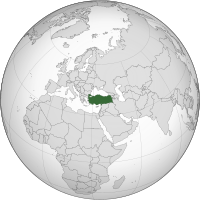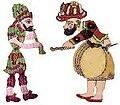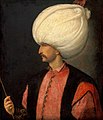
Back Portaal:Turkye Afrikaans بوابة:تركيا Arabic Portal:Türkiyə Azerbaijani پوْرتال:تورکیه AZB Портал:Турция Bulgarian প্রবেশদ্বার:তুরস্ক Bengali/Bangla Portal:Turska BS دەروازە:تورکیا CKB Portal:Türkei German Portal:Tırkiya DIQ
Merhaba! Türkiye portalına hoş geldiniz. Hi! Welcome to the Turkey portal.
 | |

| |
Turkey, officially the Republic of Türkiye, is a country mainly in Anatolia in West Asia, with a smaller part called East Thrace in Southeast Europe. It borders the Black Sea to the north; Georgia, Armenia, Azerbaijan, and Iran to the east; Iraq, Syria, and the Mediterranean Sea (and Cyprus) to the south; and the Aegean Sea, Greece, and Bulgaria to the west. Turkey is home to over 85 million people; most are ethnic Turks, while ethnic Kurds are the largest ethnic minority. Officially a secular state, Turkey has a Muslim-majority population. Ankara is Turkey's capital and second-largest city. Istanbul is its largest city, and its economic and financial center, as well as the largest city in Europe. Other major cities include İzmir, Bursa and Antalya.
Human habitation began in the Late Paleolithic. Home to important Neolithic sites like Göbekli Tepe and some of the earliest farming areas, present-day Turkey was inhabited by various ancient peoples. Hattians were assimilated by the Anatolian peoples. Classical Anatolia transitioned into cultural Hellenization following the conquests of Alexander the Great; Hellenization continued during the Roman and Byzantine eras. The Seljuk Turks began migrating into Anatolia in the 11th century, starting the Turkification process. The Seljuk Sultanate of Rum ruled Anatolia until the Mongol invasion in 1243, when it disintegrated into Turkish principalities. Beginning in 1299, the Ottomans united the principalities and expanded; Mehmed II conquered Istanbul in 1453. During the reigns of Selim I and Suleiman the Magnificent, the Ottoman Empire became a global power. From 1789 onwards, the empire saw major transformation, reforms, and centralization while its territory declined.
In the 19th and early 20th centuries, persecution of Muslims during the Ottoman contraction and in the Russian Empire resulted in large-scale loss of life and mass migration into modern-day Turkey from the Balkans, Caucasus, and Crimea. Under the control of the Three Pashas, the Ottoman Empire entered World War I in 1914, during which the Ottoman government committed genocides against its Armenian, Greek and Assyrian subjects. Following Ottoman defeat, the Turkish War of Independence resulted in the abolition of the sultanate and the signing of the Treaty of Lausanne. The Republic was proclaimed on 29 October 1923, modelled on the reforms initiated by the country's first president, Mustafa Kemal Atatürk. Turkey remained neutral during most of World War II, but was involved in the Korean War. Coups in 1960 and 1980 interrupted the transition to a multi-party system.
Turkey is an upper-middle-income and emerging country; its economy is the world's 18th-largest by nominal and 11th-largest by PPP-adjusted GDP. It is a unitary presidential republic. Turkey is a founding member of the OECD, G20, and Organization of Turkic States. With a geopolitically significant location, Turkey is a regional power and an early member of NATO. An EU-candidate, Turkey is part of the EU Customs Union, CoE, OIC, and TURKSOY.
Turkey has coastal plains, a high central plateau, and various mountain ranges; its climate is temperate with harsher conditions in the interior. Home to three biodiversity hotspots, Turkey is prone to frequent earthquakes and is highly vulnerable to climate change. Turkey has universal healthcare, growing access to education, and increasing innovativeness. It is a leading TV content exporter. With 21 UNESCO World Heritage sites, 30 UNESCO intangible cultural heritage inscriptions, and a rich and diverse cuisine, Turkey is the fourth most visited country in the world. (Full article...)
Selected article -

The confiscation of Armenian properties by the Ottoman and Turkish governments involved seizure of the assets, properties and land of the country's Armenian community. Starting with the Hamidian massacres and peaking during the Armenian genocide, the confiscation of the Armenian property lasted continuously until 1974. Much of the confiscations during the Armenian genocide were made after the Armenians were deported into the Syrian Desert with the government declaring their goods and assets left behind as "abandoned". Virtually all properties owned by Armenians living in their ancestral homeland in Western Armenia were confiscated and later distributed among the local Muslim population.
Historians argue that the mass confiscation of Armenian properties was an important factor in forming the economic basis of the Turkish Republic while endowing the Turkish economy with capital. The appropriation led to the formation of a new Turkish bourgeoisie and middle class. (Full article...)General images
Did you know -
- ... that the Balık sisters from Turkey claim to be the only identical twins who are both professional opera singers? (March 22, 2007) Wikipedia:Recent additions 129
- ... that the Senyavin Islands of Micronesia were named after Dmitry Senyavin, who destroyed the Ottoman fleet in the Battle of Athos in 1807? (April 22, 2006) Wikipedia:Recent additions 63
- ... that Sinop Fortress Prison in Turkey, abandoned in 1997, hosts hundreds of thousands tourists yearly thanks to its featuring in popular literature, music and film? (October 23, 2008) Wikipedia:Recent additions 233
- ... that the prices of goods in the Phrygian city of Aizanoi were controlled by an edict of Roman emperor Diocletian? (May 18, 2012)
- ... that Istanbul Hezarfen Airfield hosts around 30,000 music fans every September for the annual Rock'n Coke open air music festival? (January 20, 2009) Wikipedia:Recent additions 239
- ... that the Gazi Race, named in honor of Gazi Mustafa Kemal, the founder of the Turkish Republic, was won by racehorses owned by succeeding presidents İsmet İnönü and Celâl Bayar? (December 8, 2011)
- ... that Khotyn Fortress

Selected picture
Selected biography -
Mustafa İsmet İnönü (Turkish pronunciation: [isˈmet ˈinœny]; 24 September 1886 – 25 December 1973) was a Turkish army officer and statesman who served as the second president of Turkey from November 11, 1938, to May 22 1950, and as its prime minister three times: from 1923 to 1924, 1925 to 1937, and 1961 to 1965.
İnönü is acknowledged by many as Mustafa Kemal Atatürk's right-hand man, with their friendship going back to the Caucasus campaign. In the Greco-Turkish War of 1919–1922, he served as the first chief of the General Staff from 1922 to 1924 for the regular Turkish army, during which he commanded forces during the First and Second Battles of İnönü. Atatürk bestowed İsmet with the surname İnönü, the site of the battles, when the 1934 Surname Law was adopted. He was also chief negotiator in the Mudanya and Lausanne conferences for the Ankara government, successfully negotiating away the Sevre treaty for the Treaty of Lausanne. As his prime minister for most of his presidency, İnönü executed many of Atatürk's modernizing and nationalist reforms. İnönü gave the orders to carry out the Zilan Massacre. (Full article...)Selected video -
Selected quote -
| “ | Heroes who shed their blood and lost their lives! You are now lying in the soil of a friendly country. Therefore rest in peace. There is no difference between the Johnnies and Mehmets to us where they lie side by side here in this country of ours. You, the mothers, who sent their sons from far away countries wipe away your tears; your sons are now lying in our bosom and are in peace. After having lost their lives on this land they have become our sons as well. | ” |
Recognized content
Provinces
Related portals
Religions in Turkey
Neighbouring countries
Countries with related heritage
WikiProjects
Turkish wikipedia
 |
There is a Turkish version of Wikipedia, the free encyclopedia. |
Wikimedia
The following Wikimedia Foundation sister projects provide more on this subject:
-
Commons
Free media repository -
Wikibooks
Free textbooks and manuals -
Wikidata
Free knowledge base -
Wikinews
Free-content news -
Wikiquote
Collection of quotations -
Wikisource
Free-content library -
Wikiversity
Free learning tools -
Wikivoyage
Free travel guide -
Wiktionary
Dictionary and thesaurus
© MMXXIII Rich X Search. We shall prevail. All rights reserved. Rich X Search














































































































